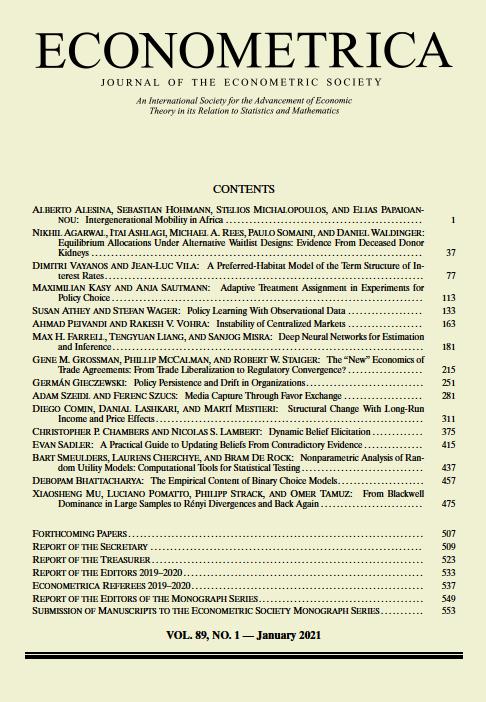评论:“Fisher-Schultz讲座:随机实验中异质治疗效果的通用机器学习推断,在印度的免疫应用”,作者:Victor Chernozhukov, Mert Demirer, Esther Duflo和Iván Fernández-Val
IF 7.1
1区 经济学
Q1 ECONOMICS
引用次数: 0
摘要
我们使用Luedtke和van der Laan(2016)的鞅结构来开发治疗异质性存在的测试。由此产生的顺序验证方法可以使用各种验证指标(如blp、GATES、QINI曲线等)进行实例化,并为这些指标的交叉验证提供了一种替代方案。本文是对Chernozhukov、Demirer、Duflo和Fernández-Val发表在《计量经济学》上的Fisher-Schultz论文的评论。本文章由计算机程序翻译,如有差异,请以英文原文为准。
A Comment on: “Fisher–Schultz Lecture: Generic Machine Learning Inference on Heterogeneous Treatment Effects in Randomized Experiments, With an Application to Immunization in India” by Victor Chernozhukov, Mert Demirer, Esther Duflo, and Iván Fernández-Val
We use the martingale construction of Luedtke and van der Laan (2016) to develop tests for the presence of treatment heterogeneity. The resulting sequential validation approach can be instantiated using various validation metrics, such as BLPs, GATES, QINI curves, etc., and provides an alternative to cross-validation-like cross-fold application of these metrics. This note was prepared as a comment on the Fisher–Schultz paper by Chernozhukov, Demirer, Duflo, and Fernández-Val, forthcoming in Econometrica.
求助全文
通过发布文献求助,成功后即可免费获取论文全文。
去求助
来源期刊

Econometrica
社会科学-数学跨学科应用
CiteScore
11.00
自引率
3.30%
发文量
75
审稿时长
6-12 weeks
期刊介绍:
Econometrica publishes original articles in all branches of economics - theoretical and empirical, abstract and applied, providing wide-ranging coverage across the subject area. It promotes studies that aim at the unification of the theoretical-quantitative and the empirical-quantitative approach to economic problems and that are penetrated by constructive and rigorous thinking. It explores a unique range of topics each year - from the frontier of theoretical developments in many new and important areas, to research on current and applied economic problems, to methodologically innovative, theoretical and applied studies in econometrics.
Econometrica maintains a long tradition that submitted articles are refereed carefully and that detailed and thoughtful referee reports are provided to the author as an aid to scientific research, thus ensuring the high calibre of papers found in Econometrica. An international board of editors, together with the referees it has selected, has succeeded in substantially reducing editorial turnaround time, thereby encouraging submissions of the highest quality.
We strongly encourage recent Ph. D. graduates to submit their work to Econometrica. Our policy is to take into account the fact that recent graduates are less experienced in the process of writing and submitting papers.
 求助内容:
求助内容: 应助结果提醒方式:
应助结果提醒方式:


